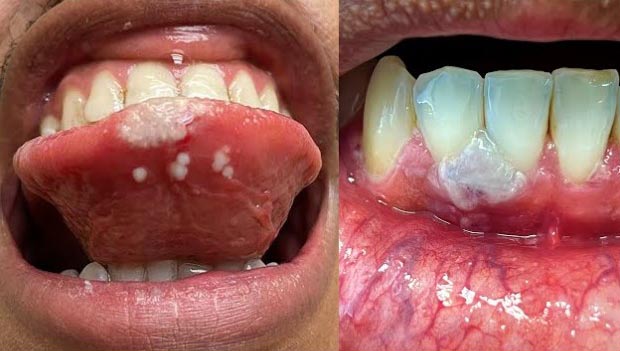Nikhil Prasad Fact checked by:Thailand Medical News Team Aug 30, 2024 1 year, 6 months, 4 days, 22 hours, 15 minutes ago
In recent weeks, the global medical community has been increasingly focused on the resurgence of Mpox (formerly known as monkeypox), particularly as the virus spreads beyond its traditional endemic regions in Africa. Among the various complications associated with Mpox, the emergence of oral lesions has become a significant concern for healthcare providers. This
Medical News report delves into the critical issue of oral manifestations linked to Mpox, highlighting the need for early detection and management to prevent severe outcomes.
 Mpox infections can lead to a variety of oral lesions
Rising Concern: Oral Lesions in Mpox Patients
Mpox infections can lead to a variety of oral lesions
Rising Concern: Oral Lesions in Mpox Patients
Mpox, an orthopoxvirus, has historically been considered a zoonotic disease, with limited cases reported in humans. However, recent outbreaks, particularly those outside of Africa, have shown that the virus can spread more widely than previously thought, affecting various parts of the body, including the oral cavity. Oral lesions, once a relatively overlooked aspect of Mpox, are now recognized as a common and potentially severe manifestation of the disease.
A systematic review and meta-analysis published in eClinicalMedicine in early 2023 revealed that approximately 36.75% of patients with Mpox experience oral manifestations. This prevalence highlights the importance of considering oral health in the management of Mpox cases. The study, which analyzed data from 19 studies involving over 4,000 laboratory-confirmed Mpox patients, found that oral lesions were not only common but also varied in presentation, with sore throat, mouth sores, tonsillitis, and mouth rash being the most frequently reported symptoms.
Case Reports: The Alarming Reality of Oral Lesions
A particularly striking case reported in the JACEP Open journal involved a 43-year-old HIV-positive male who presented with painful tongue lesions that had persisted for seven days. The lesions, which initially appeared as blisters on the tip of the tongue, rapidly progressed, leading to significant swelling, fever, sore throat, and difficulty in eating. Polymerase chain reaction (PCR) testing confirmed Mpox as the causative agent, despite the absence of a clear exposure history. This case underscores the potential severity of oral lesions in Mpox patients and the challenges they pose in terms of diagnosis and treatment.
Oral lesions in Mpox are not merely a cosmetic issue; they can significantly impact a patient's quality of life and may lead to serious complications. For instance, lesions in the oropharynx, particularly those affecting the tonsils, can result in swelling that compromises airway patency, leading to difficulty swallowing and breathing. In some cases, these lesions have been severe enough to necessitate hospitalization.
Understanding the Mechanisms: How Mpox Affects the Oral Cavity
The pathophysiology behind oral lesions in Mpox patients is still being studied, but current evidence suggests that the virus can directly infect the oral mucosa, leading to the development of lesions. These lesions can appear even before the characteristic skin rashes, making them an early indicator of the disease. This article emph
asizes the importance of recognizing these oral signs early, as they may provide a crucial window for intervention before the virus spreads more extensively within the body.
The systematic review conducted by Gandhi et al. revealed that the prevalence of oral lesions varied significantly based on geography, with higher rates observed in endemic regions like Africa compared to non-endemic areas such as Europe and North America. This geographic variation may be attributed to differences in the population's immune status, co-existing health conditions, and possibly the strain of the virus involved.
Clinical Implications: The Need for Vigilance in Diagnosis and Treatment
For healthcare providers, the presence of oral lesions in a patient should raise immediate concern for Mpox, particularly in regions where the virus is known to be circulating. Early diagnosis is crucial, not only for the timely management of symptoms but also for preventing the spread of the virus to others. Given that oral lesions can precede skin manifestations, clinicians should include a thorough oral examination in their assessment of patients presenting with fever, sore throat, or other nonspecific symptoms.
The management of oral lesions in Mpox patients typically involves supportive care, including pain relief and the use of topical treatments to reduce inflammation and prevent secondary infections. However, in severe cases, more aggressive interventions may be necessary, particularly if the lesions threaten airway patency. In the case mentioned earlier, the patient required hospitalization for dehydration and lactic acidosis, conditions exacerbated by his inability to eat or drink due to the severity of his oral lesions.
Conclusion: A Call for Increased Awareness and Research
As the global health community continues to grapple with the challenges posed by Mpox, the importance of recognizing and managing oral manifestations cannot be overstated. Oral lesions, while common, can lead to significant morbidity if not promptly addressed. The findings from recent studies highlight the need for continued research into the pathophysiology of Mpox, particularly its effects on the oral cavity, to develop more effective treatment strategies and improve patient outcomes.
In summary, this article underscores the critical need for healthcare providers to be vigilant in detecting and managing oral lesions in Mpox patients. By doing so, they can not only alleviate the suffering of individual patients but also help to curb the spread of this increasingly prevalent disease.
References:
Oral manifestation of the monkeypox virus: a systematic review and meta-analysis
https://www.thelancet.com/journals/eclinm/article/PIIS2589-5370(22)00546-6/fulltext
The 2022 human monkeypox outbreak and dentistry: The relevance of oral mucosal and facial skin lesions
https://onlinelibrary.wiley.com/doi/10.1111/scd.12776
Man with painful tongue lesions
https://onlinelibrary.wiley.com/doi/epdf/10.1002/emp2.12858
Oral Manifestations in Monkeypox: A Scoping Review on Implications for Oral Health
https://www.mdpi.com/2304-6767/11/5/132
Monkeypox and oral lesions associated with its occurrence: a systematic review and meta-analysis
https://f1000research.com/articles/12-964/v2
Monkeypox-related oral manifestations and implications: Should dentists keep an eye out?
https://onlinelibrary.wiley.com/doi/10.1002/jmv.28091
For the latest Mpox News, keep on logging to Thailand
Medical News.
Read Also:
https://www.thailandmedical.news/news/miami-study-sounds-alarm-that-mpox-can-also-cause-gastrointestinal-complications-and-inflammation-of-the-rectum
https://www.thailandmedical.news/news/study-finds-that-mpox-virus-infects-human-astrocytes-causing-neuroinflammation-and-eventual-brain-damage
